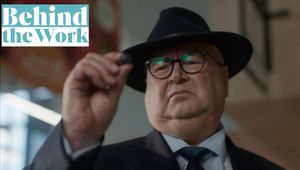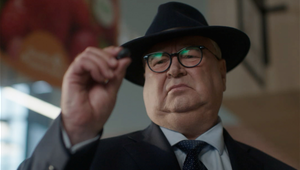
5 Things: What Advertising Can Learn from Stage Acting

In a brand-new series on LBB, the Droga5 Dublin team (part of Accenture Song) will share the five things that are catching their attention or the unlikely avenues that are proving to be fruitful sources of inspiration. They’ll also use their expertise to give advice to others working in the industry at large. It’s going to be useful, it’s going to be interesting, and it will certainly be entertaining.
Kicking off the series is copywriter Emmet Heneghan who also happens to be a stage actor when off the proverbial clock. Acting has taught Emmet quite a few transferable skills that he’s taken back to the office and his team. He’s learned that “faked confidence” can indeed translate into something real; that it’s possible to achieve a lot in less time - with focus; and that embracing big characters can prove very insightful. And that’s just the start.
Below are the five transferable lessons that Emmet has learned from stage acting which are helping him better present creative work, craft narratives, and embracing “lunatics”.
Emmet’s 5 Things: Stage Acting
When I was poached to take part in a theatrical adventure on the All-Ireland drama circuit, I didn’t set out to improve skills in my career. But it is undeniable that some of the things I was forced to quickly pick up on during my time on the stage bled into my day job. Here are but five standout things that acting onstage taught me about presenting creative work:
1) Project confidence, even when you don’t have it – at the beginning of my first couple of shows I had a couple of real ‘WHAT AM I DOING HERE?!’ moments, but as soon as my cues came up there was no choice but to get on with it. With each successfully delivered line, that initially faked confidence became the real thing.
2) Dedicate less time, more focused…ly – my evenings have been taken up with rehearsals and shows of late, which means that I’ve had to use my time in the office to the maximum, knowing that I couldn’t work late in the evenings as is known to happen on occasion. Throwing myself wholeheartedly into work during the day and something entirely different at night requires a lot of focus and perspective – and I start each new working day with a fresher, clearer mind.
3) Treat your presentations like a script – during the build up to our first run of performances I had a pitch, shoots, and a creative platform to create, and so I used the same tactics for learning off lines quickly for the play for the bigger presentations – to great effect!
4) Embrace a wider cast and crew – the world of amateur dramatics is full of absolute lunatics. But guess what… so is the world of advertising. I’ve had to mingle with a lot of very different, very BIG personalities but have found working with them all gives you various insights into how to carry yourself to create the best end result you can together. It’s something we already do at work, but it’s fascinating to get a new steer on it.
5) Crafting narrative clarity – It’s pretty easy to present a deck from slide one to slide whatever-we’re-on-now, but having seen the merits of adapting a stage work as we moved through the All-Ireland circuit gave us tangible reactions to what happens when you alter the story you’re telling. This clear narrative purpose is something advertisers can bring into every single presentation, big or small.
So, there we have it. An exploration into the beautiful space in the 'advertiser – amateur actor' Venn diagram. It’s hard to say whether art is imitating corporate life here, or vice versa.
The real hope is to inspire others to take up hobbies that complement their work but puts them out of their comfort zone. So, find something that terrifies and excites you. Something so potentially mortifying you feel alive. And if you can, invite your work friends along to make a work night out of it at your own expense.















